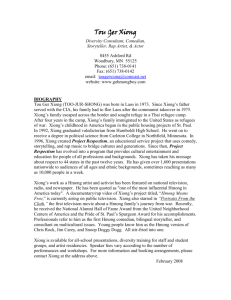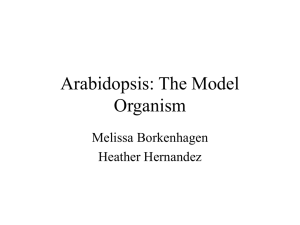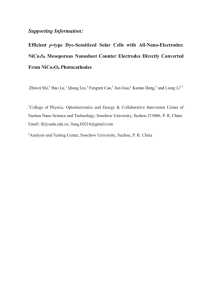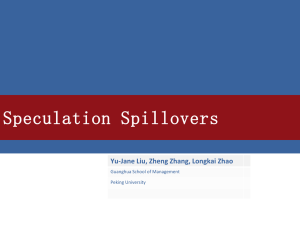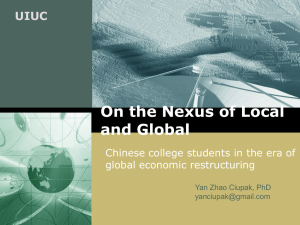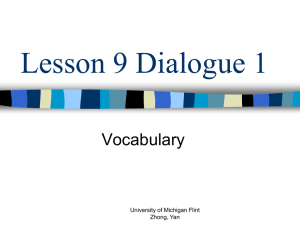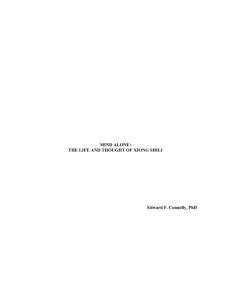Yan Xiong
advertisement
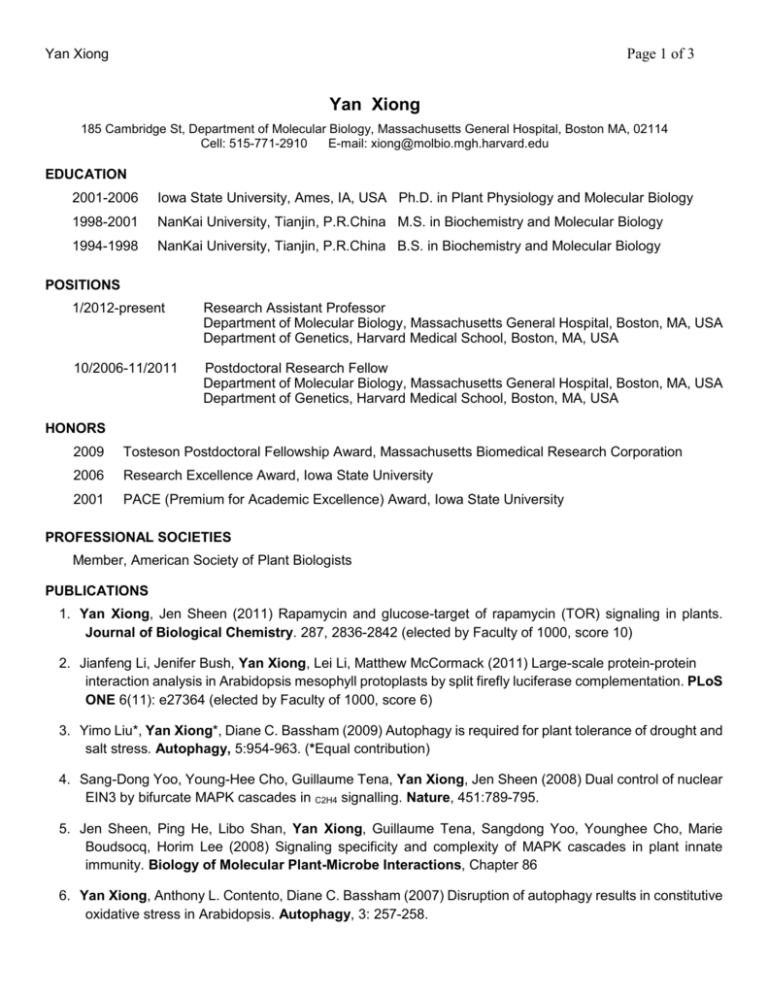
Page 1 of 3 Yan Xiong Yan Xiong 185 Cambridge St, Department of Molecular Biology, Massachusetts General Hospital, Boston MA, 02114 Cell: 515-771-2910 E-mail: xiong@molbio.mgh.harvard.edu EDUCATION 2001-2006 Iowa State University, Ames, IA, USA Ph.D. in Plant Physiology and Molecular Biology 1998-2001 NanKai University, Tianjin, P.R.China M.S. in Biochemistry and Molecular Biology 1994-1998 NanKai University, Tianjin, P.R.China B.S. in Biochemistry and Molecular Biology POSITIONS 1/2012-present Research Assistant Professor Department of Molecular Biology, Massachusetts General Hospital, Boston, MA, USA Department of Genetics, Harvard Medical School, Boston, MA, USA 10/2006-11/2011 Postdoctoral Research Fellow Department of Molecular Biology, Massachusetts General Hospital, Boston, MA, USA Department of Genetics, Harvard Medical School, Boston, MA, USA HONORS 2009 Tosteson Postdoctoral Fellowship Award, Massachusetts Biomedical Research Corporation 2006 Research Excellence Award, Iowa State University 2001 PACE (Premium for Academic Excellence) Award, Iowa State University PROFESSIONAL SOCIETIES Member, American Society of Plant Biologists PUBLICATIONS 1. Yan Xiong, Jen Sheen (2011) Rapamycin and glucose-target of rapamycin (TOR) signaling in plants. Journal of Biological Chemistry. 287, 2836-2842 (elected by Faculty of 1000, score 10) 2. Jianfeng Li, Jenifer Bush, Yan Xiong, Lei Li, Matthew McCormack (2011) Large-scale protein-protein interaction analysis in Arabidopsis mesophyll protoplasts by split firefly luciferase complementation. PLoS ONE 6(11): e27364 (elected by Faculty of 1000, score 6) 3. Yimo Liu*, Yan Xiong*, Diane C. Bassham (2009) Autophagy is required for plant tolerance of drought and salt stress. Autophagy, 5:954-963. (*Equal contribution) 4. Sang-Dong Yoo, Young-Hee Cho, Guillaume Tena, Yan Xiong, Jen Sheen (2008) Dual control of nuclear EIN3 by bifurcate MAPK cascades in C2H4 signalling. Nature, 451:789-795. 5. Jen Sheen, Ping He, Libo Shan, Yan Xiong, Guillaume Tena, Sangdong Yoo, Younghee Cho, Marie Boudsocq, Horim Lee (2008) Signaling specificity and complexity of MAPK cascades in plant innate immunity. Biology of Molecular Plant-Microbe Interactions, Chapter 86 6. Yan Xiong, Anthony L. Contento, Diane C. Bassham (2007) Disruption of autophagy results in constitutive oxidative stress in Arabidopsis. Autophagy, 3: 257-258. Yan Xiong Page 2 of 3 7. Yan Xiong, Anthony L. Contento, Phan Quang Nguyen, Diane C. Bassham (2007) Degradation of oxidized proteins by autophagy during oxidative stress in Arabidopsis. Plant Physiology. 143: 291-299. 8. Yan Xiong, Anthony L. Contento, Diane C. Bassham. (2005) AtATG18a is required for the formation of autophagosomes during nutrient stress and senescence in Arabidopsis thaliana. Plant Journal. 42: 535-546. 9. Anthony L. Contento*, Yan Xiong*, Diane C. Bassham. (2005) Visualization of autophagy in Arabidopsis using the fluorescent dye monodansylcadaverine and a GFP-AtATG8e fusion protein. Plant Journal. 42:598-608. (*Equal contribution) 10. Wei-min Li, Qing-dai Liu, Yan Xiong, Shu-Fang Wang, Ning-ning Wang, Yong Wang (2003) Significant role of cytokinins in maintaining the life of fronds in Spirodela polyrrhiza. Journal of Plant Physiology and Molecular Biology. 29 (3): 215-220 11. Yan Xiong, Cuimin Liu, Shufang Wang, Ningning Wang, Yong Wang (2002) Chloroplast Genome and the Regulation of Chloroplast-encoded Gene Expression. Plant Physiology Communications 38 (3):264-270 12. Cuimin Liu, Yan Xiong, Shufang Wang, Ningning Wang, Yong Wang (2002) cDNA Cloning and Expression of rbcS Gene in Spirodela polyrrhiza. Plant Physiology Communications 38(3): 221-225 Papers in preparation and/or in the review process 1. Yan Xiong, Matthew McCormack, Qi Hall, Chengbin Xiang, Jen Sheen. Glucose-TOR signaling orchestrates metabolic transcriptome and meristem establishment (submitted to Nature, under review). We report exciting and unexpected discoveries on how the plant TOR kinase orchestrates nutrient signaling and meristem establishment in photoautotrophic plant growth fuelled by solar energy, CO2 and water. Although mammalian TOR regulates growth and proliferation mainly through translational processes, our studies uncover a central role of glucose-TOR signaling in controlling transcriptional networks involved in cell cycle, transcription, signaling, metabolism, transport and folding in Arabidopsis, which may represent a previously unknown but universal phenomenon in all multicellular organisms from plants to human. We further discover E2Fa transcription factor as a novel TOR kinase substrate, which governs novel and crucial for transcriptional activation of cell cycle S-phase genes and root meristem establishment. 2. Yan Xiong, Matthew McCormack, Morris Feldman, Jianfeng Li, Kevan Shokat, Jen Sheen. TOR kinase as a switch gating nutrient signaling and microbe-independent innate immunity (In preparation). TOR kinase is an evolutionarily conserved master regulator that integrates nutrients and energy signaling to promote cell proliferation and growth. Surprisingly, blocking TOR kinase triggers rapid transcriptional reprogramming and microbe-independent innate immune signaling. We identify specific MAKKKs, ANP1/2, as direct and novel TOR kinase substrates. Diverse chemical TOR inhibitors or TOR-resistant ANP1/2 activate MKK4/5-MPK3/6 cascades and the innate immune program. TOR kinase serves an ancient and antagonistic link between the complex internal nutrient and environmental stress, and may predate the evolution of microbe- and pattern recognition receptor (PRR)-activated innate immunity. Yan Xiong Page 3 of 3 CONFERENCE PROCEEDINGS, POSTERS, AND ORAL PRESENTATIONS 1. Yan Xiong and Jen Sheen (2011) Novel TOR Kinase Functions in the Energy and Defense Signaling Network. Plant Protein Phosphorylation Workshop. Lake Tahoe, CA, 2011. (invited as a speaker) 2. Yan Xiong and Diane C. Bassham (2006) Autophagy is required for plants to survive under abiotic stresses. ASPB Plant Biology, Boston, MA, 5-9 August 2006. (invited as a mini-symposium speaker) 3. Yan Xiong and Diane C. Bassham (2006) Autophagy is required for plants to survive under abiotic stresses. 17th International Conference on Arabidopsis Research. Madison, WI (invited as a mini-symposium speaker) 4. Yan Xiong and Diane C. Bassham (2005) AtATG18a is required for the formation of autophagosomes during nutrient stress and senescence in Arabidopsis thaliana. 16th International Conference on Arabidopsis Research. Madison, WI 5. Yan Xiong, Anthony L. Contento, Diane C (2004) Bassham AtATG181 is required for normal autophagy function in Arabidopsis. ASPB Plant Biology 2004. Lake Buena Vista, FL

